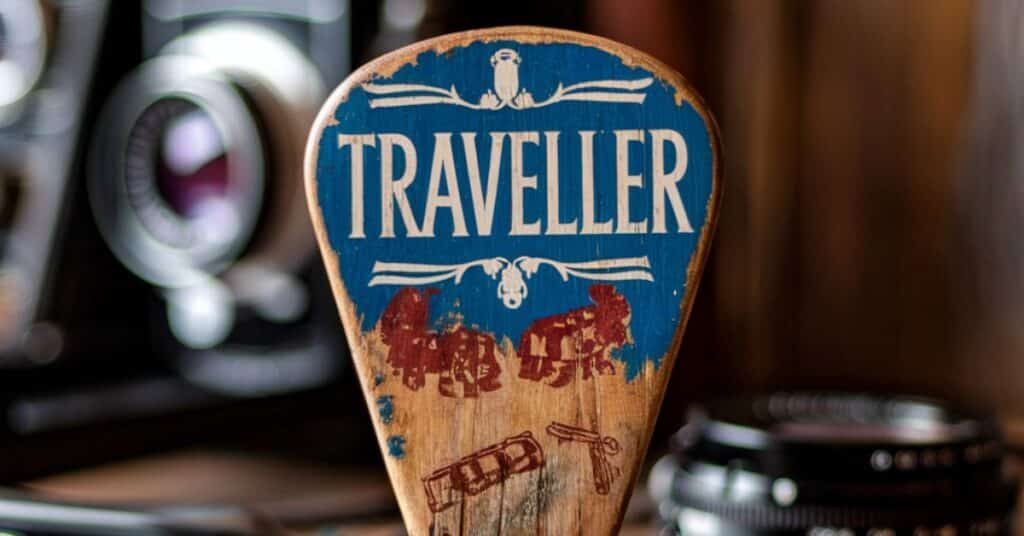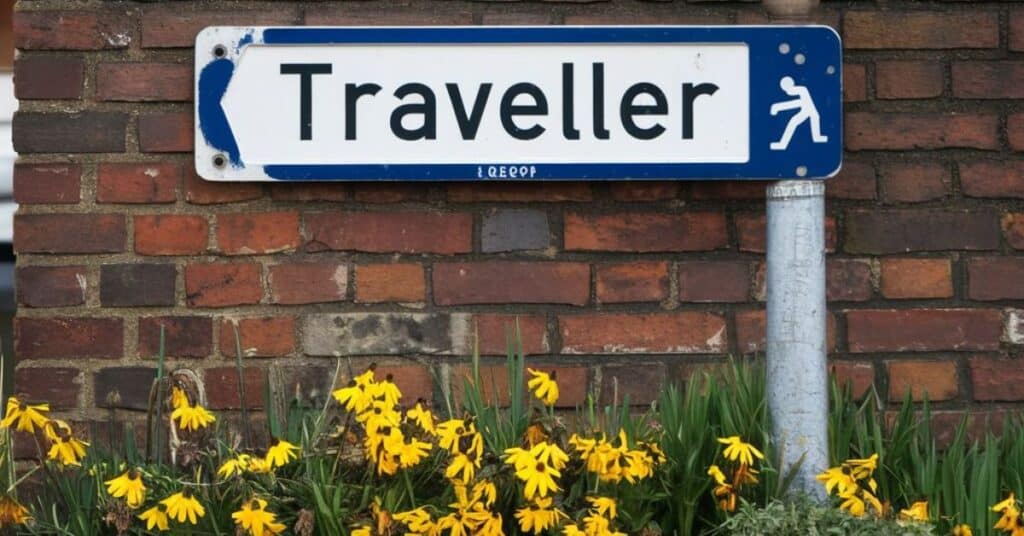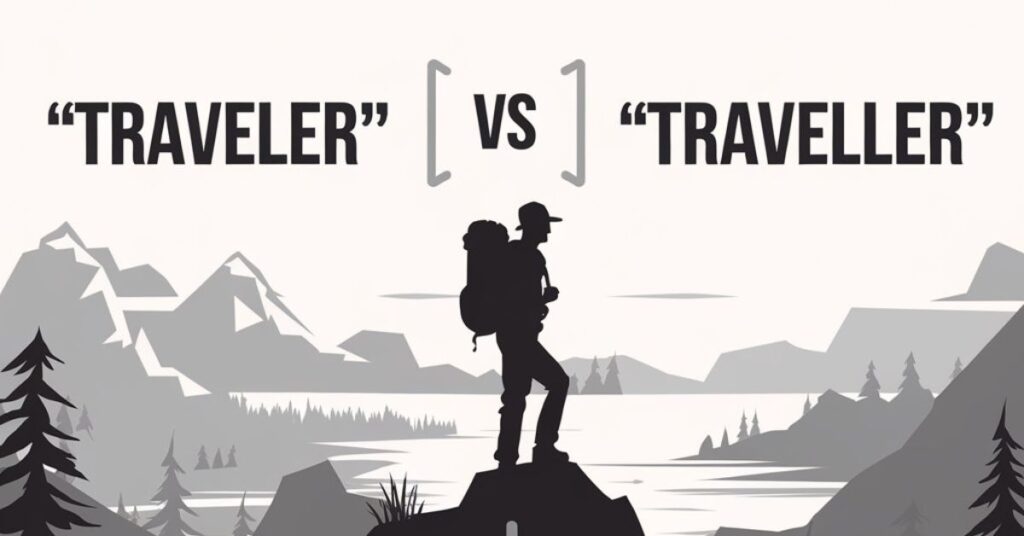When it comes to the spelling of certain English words, many are confused by the variations between American and British English. One classic example is “traveler” vs “traveller.”
Both are correct, but each is used in different parts of the world. In this article, we’ll dive deep into why there’s a difference, when to use each spelling, and how these variations reflect the broader changes in the English language.
A simple table of different countries to use Traveler and traveller
| Country | Traveler (%) | Traveller (%) |
|---|---|---|
| United States | 87 | 13 |
| United Kingdom | 23 | 77 |
| India | 13 | 87 |
| Philippines | 63 | 37 |
| Canada | 62 | 38 |
| Australia | 13 | 87 |
| Liberia | 29 | 71 |
| Ireland | 15 | 85 |
| New Zealand | 30 | 70 |
| Jamaica | 56 | 44 |
| Trinidad & Tobago | 53 | 47 |
| Guyana | 0 | 0 |
American Way: ‘Traveler’
In American English, the preferred spelling is traveler with a single ‘l’. This is consistent with many other Americanized words where the British version tends to have double letters. The United States, known for simplifying spelling conventions, often drops an extra ‘l’ to streamline words. For example, compare “canceled” to “cancelled.”
The reasoning behind this is rooted in Noah Webster’s reforms in the early 19th century. Webster, the father of American English, sought to create a language distinct from British English. By dropping unnecessary letters, he aimed to make American English more efficient and logical. So, if you’re traveling within the United States, you’ll come across the spelling traveler almost exclusively.
Examples of ‘Traveler’ in American English:
- “The traveler checked into the hotel after a long flight.”
- “Many American travelers visit Europe each year.”
In American publications and on websites, you’ll see this spelling used across the board, as it aligns with the standard American style of English. For instance, US books, travel blogs, and government documents will all consistently use traveler with one ‘l’.
British Style: ‘Traveller’

On the other side of the Atlantic, British English retains the double ‘l’ in words like traveller. This is because British English has a more traditional spelling system that reflects the original forms of many words. In the UK, traveller is the correct and accepted form, used in everything from UK books to British websites.
Traveller isn’t just limited to the UK. This spelling is also used in many Commonwealth countries, such as Australia, Canada, and New Zealand. So, if you’re reading a travel guide from a British or Australian author, expect to see traveller with two ‘l’s.
Examples of ‘Traveller’ in British English:

- “The weary traveller rested by the fireplace at the inn.”
- “British travellers often choose scenic routes for their road trips.”
British publications like The Guardian, The Times, or BBC articles will always use the traveller form. This adherence to traditional spelling reflects a broader cultural emphasis on maintaining historical linguistic roots.
Where and How to Use
So, when should you use traveler and when should you use traveller? The answer depends on where you’re writing or who your audience is. Here’s a simple breakdown:
| Region/Country | Preferred Spelling | Example Sentence |
| United States | Traveler | “The traveler boarded the plane for New York.” |
| United Kingdom | Traveller | “The traveller enjoyed a cup of tea at the English countryside inn.” |
| Canada | Traveller | “Canadian travellers often explore both the US and Europe.” |
| Australia/New Zealand | Traveller | “Many Australian travellers enjoy exploring Southeast Asia.” |
In formal writing, it’s crucial to be aware of these regional differences to avoid confusion or appearing uninformed. If you’re submitting an article to a British journal, traveller is the correct choice. If you’re writing for an American audience, traveler should be your go-to.
Language Changes and Evolution
The variations between traveler and traveller are part of the broader language evolution that affects all languages, especially English. English has been constantly evolving for centuries, absorbing influences from Latin, Old French, and many other languages.
In the 1800s, Noah Webster made a conscious effort to differentiate American English from British English, leading to changes in spelling that we still see today. His goal was to simplify language and reflect the unique American identity. This explains why American spelling is often simpler and more phonetic, as seen with traveler vs. traveller.
Examples of Language Evolution:
- “Color” (American) vs “Colour” (British)
- “Center” (American) vs “Centre” (British)
- “Honor” (American) vs “Honour” (British)
In these examples, American spelling tends to drop the extra letters, while British English holds onto them, reflecting the traditional and historic roots of the language.
Differences and When to Use Each
The choice between traveler and traveller is ultimately tied to geography and audience. Here’s a quick reference table to help clarify when and where to use each spelling:
| Criteria | Traveler (American) | Traveller (British) |
| Region | United States, Philippines | United Kingdom, Australia, Canada, New Zealand |
| Spelling Pattern | Single ‘l’ | Double ‘l’ |
| Usage Example | “The traveler explored the Grand Canyon.” | “The traveller visited the Tower of London.” |
When writing for a global audience, it’s essential to be aware of these spelling differences. If your writing will be read by both American and British audiences, consistency is key. You may choose one form and stick with it, or adjust depending on your target region.
Language Changes
Language changing is not a new phenomenon. It’s happening all around us as we speak, and the variations between traveler and traveller are just one of many examples of how language evolves over time. As cultures shift and global communication increases, language must adapt to accommodate new contexts, technologies, and influences.
Today, we see more instances of language diversity due to the globalized world we live in. While Americans prefer the traveler spelling, they’re often exposed to traveller through international media and British publications. The linguistic variety we experience today is a reflection of centuries of language development.
Examples of Language Changes Over Time:
- Old English transformed into Middle English, which later became Modern English.
- Words like “thou” and “thee” faded out of everyday language.
- New technologies introduced terms like “email”, “blog”, and “hashtag” into common use.
Conclusion
In conclusion, whether you use traveler or traveller depends entirely on your audience and location. Both forms are correct, but they serve different regions. Understanding the distinction between American English and British English spellings will make your writing more appropriate and targeted. Language is constantly evolving, and being aware of these changes allows you to stay ahead of the curve.
When in doubt, follow the spelling conventions of your target audience or region. If you’re writing for a global audience, be consistent or include a note explaining the variations.
To sum it up:
- Use traveler for American English readers.
- Use traveller for British English and Commonwealth readers.
By paying attention to these small details, you’ll ensure your writing is accurate, polished, and globally understood. Happy traveling—or should I say, travelling?

“Robert Henry is an experienced blogger with a passion for language and education. His insightful posts on Vocab Scope offer readers valuable tips on vocabulary and grammar. With a background in linguistics and a knack for clear, engaging writing, Robert is dedicated to helping others enhance their communication skills.”






